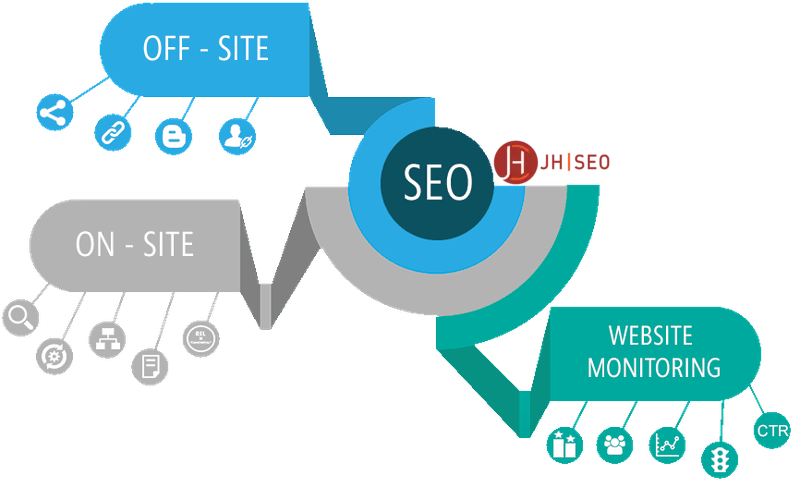As with every answer to any Search Engine Optimization question, the answer is: it depends… Depending on the affecting factors, significant Search Engine Optimization efforts can take around six months to 2 years. But keyword-based results can be seen in only days, depending on the keyword difficulty.
But don’t worry. We will cover every affecting factor for your law firm in this article so that you can calculate the time needed for SEO strategies yourself.
Different SEO Goals Take Different Amounts of Effort
How long does SEO take? What should be our content strategy? A PPC campaign is a must for SEO? Most law firms wonder about these questions.
Yet, it would be best if you instead asked these questions:
Is your goal dominating every SERP in your niche? Or do you want to rank on a few local keywords? Are you targeting all search engines or just particular ones?
If your goal is more significant, achieving it will take more time. Ranking on local or long-tail terms with less competition is more manageable than ranking on national keywords.
In this article, we will provide the calculation process so that you can estimate the amount of time and effort needed to achieve your SEO goals.
Factors that Affect Search Engine Optimization Time
Two main factors affect how much time SEO efforts take:
1. Current optimization status of your website
2. Optimization status of your competitors
And to determine the optimization status of your website and your competitor’s websites, you need to check a few metrics.
Reviewing Your Websites Current Optimization
Before reviewing your website optimization status, you should note the metrics on a document or paper or save screenshots.
You will need these notes when comparing your website to your top competitors.
Technical Readiness of Your Website
Technical SEO is one of the factors (link) that can make or break a website. You will need to use a few tools to see if there are any technical issues on the website and how much workload the current problems create.
Speed
As technology grows more, as people, we are becoming more impatient. Even a slight delay can frustrate users, and statistics can even show more details:
- %25 visitors abandon a website if it takes more than 4 seconds to load.
- %46 of users need to revisit better-performing websites.
- A 1-second delay reduces customer satisfaction by 16%.
That’s why web page speed is one of the important factors that Google considers. You can review your web page speed with a few different tools:
- https://pagespeed.web.dev
- https://gtmetrix.com
- https://tools.pingdom.com
- https://www.webpagetest.org
With these tools, you can have a rough idea of how fast your website and pages are.
Crawlability & Indexability
Crawlability and indexability mean how Google bots can access and index the content of your website, and they are the most important factors for Search Engine Optimization (SEO). To review your website crawlability & indexability status you can use the following tools:
- Google Search Console: Click the “Pages” after you log in to your GSC account (Click here if you want to set up GSC for your website).
Now you can see the pages that are indexed and not indexed and why they are not indexed. You can review these reports to see how many pages need working on and note your findings for comparison.
You can also use other SEO crawlers to find out how accessible your pages are:
- Screaming Frog (Free with a crawl limit of 500 URLs)
- Semrush(119.95$ / Month)
- Oncrawl (69$ / Month)
- Ahrefs (99$ / Month)
Internal Link Structure
Internal links are essential because they help the bots navigate your website and increase a web page’s relevance. You can use the Search Engine Optimization (SEO) crawlers mentioned above to measure the internal link structure of your website.
You can also use GSC for this purpose. The internal links are listed in the “Links”> “Internal Links” section of GSC.
Determining which pages need more internal links can give a rough idea of how much time is required in this aspect of the website.
Responsive Design
Did you know that 62.06% of all website traffic comes from people using mobile devices? That’s why Google rewards mobile-friendly websites!
You can use Google’s mobile-friendly test tool to see whether your website is responsive. If your website is not mobile-friendly, then it’s another issue you must fix to see SEO results.
User Experience
Google has been putting more and more weight on user experience, which became crystal clear when they announced a web vitals update.
Web vital metrics are related to user experiences, such as page load speed, content visibility, and content shift on the page.
You can use the Google Lighthouse tool to check these metrics and have a rough idea of how your website performs in terms of user experience.
If your website is lacking in this area, this will be another thing you need to fix, increasing the time necessary for a successful SEO campaign.
Your Online Reputation
Would you trust someone you don’t know and send your valuable leads to them? Of course not. This is also something that Google tries to implement in its search algorithm.
Google wants to show results from websites it trusts, but “trust” is a complex metric for bots.
That’s why Google relies on online reviews, mentions from trusted sources(news, directories, wiki, etc.), ratings, and social proof to determine the level of trust. That’s why having an excellent online reputation is essential for SEO success.
You can use Google search to determine how many online reviews and mentions your website has. To do this with Google search, you can use advanced search operators such as “site:” double quotes, “AND,” “OR,” and parentheses. You can also use tools like Ahrefs, Semrush, and Moz to measure these metrics and conquer search engines to get remarkable SEO results!
These tools will only show you their data and direct links to your website.
This can be enough for rough measurement, but if you want to dive deep and get as accurate as possible, we suggest using advanced Google operators to review unlinked mentions of you, your employees, and your website.
Note how many backlinks and mentions your website and you (as a lawyer) have online. You’ll need this information to compare your website to your competitors.
Topical Coverage on Your Website
Google’s main objective is to satisfy any search intent that its users might have. This is a highly complex task to achieve.
Still, one of Google’s ways to accomplish this goal is by rewarding websites that publish detailed content around a topic called topical authority.
To measure how many indexed pages you have, you can search “yourdomain.com” on Google, which will return a list of currently indexed pages.
Alternatively, you can find this data on GSC as well (“Pages”> “Indexed Pages”).
But we recommend taking it one step ahead and searching for one-word-long keywords related to your niche. For example, you can search “accident” site:yourdomain.com” on Google to get a list of web pages that have “accident” in them.
To measure your topical coverage, you can repeat this step for other related keywords.
There are no set-in-stone numbers that you should aim for, but later on, you can do this for competitors to measure the gap between them and your website.
On-Page Optimization of Your Pages
And the last metric you need to look at is your on-page optimization status of specific web pages. Here are a few checkpoints you can use:
- Do you target different keywords on each page?
- Do you have the targeted keyword in the title, meta description, and H1?
- Does the page content satisfy the search intent of the targeted keyword?
- Do you link to (and get links from) related pages on your website?
- Is the author of the page visible?
- Does the mentioned author link back to your website from their social media accounts?
These checkpoints give you an idea of how optimized your pages are. You don’t need to review every single page; just examining a few should tell you the on-page optimization status of your pages.
Reviewing Your Competitor's Optimization Status
Now that you have an idea of how optimized your website is and have some numbers and metrics at hand for comparison, to get a realistic estimate of the SEO time frame, you need to do all of it for your competitors and note your findings.
In the end, you’ll use all of the data to set realistic SEO goals.
Who are Your Competitors?
Your competitors depend on which keywords you want to target. If your target keyword is “accident lawyer NYC,” then law firms and solo-practitioner websites that rank well for your target keyword are your main competitors. We recommend selecting only websites that provide similar services to you.
This way, you’ll be able to make an apple-to-apple comparison. If you pick https://lawyers.law.com as a competitor, you will need more accurate information than your comparison.
So selecting competitors similar to you (A law firm or a solo-practitioner website) is crucial to get accurate results from your comparison.
Repeating the Reviewing Steps for Your Competitors
It’s time to review the competitor’s optimization status, and you know to do so! You need to repeat what you did for your website for each one of your competitor’s websites.
We recommend picking 3-5 competitors for maximum efficiency and accuracy, but if there aren’t enough competitors similar to you, 2-3 should also be enough.
The only difference when reviewing your competitors’ needs is access to GSC. Instead, you’ll need to use other tools, such as Semrush and Ahrefs, to get the necessary information.
How to Calculate the Time Needed for SEO Efforts Result?
Thanks to the steps above, we have all the information we need to calculate the time required for SEO results accurately. You can start the calculation with technical SEO fixes.
Technical SEO = “How many pages that need fixing x How much time it would take to fix each page = Total Amount of Time Needed for Technical SEO Fixing”
If you need to estimate how much time it would take to fix pages, you can ask freelancers on a freelancer network such as UpWork, or get a quote for the fixes from web development agencies with time estimation.
On-Page SEO Fixes = “How many pages that needs optimizing x How much time it would take to optimize each page = Total Amount of Time Needed for On-Page SEO Optimizations”
Content Gap = “(How many content your competitors have on average – How many content you have) x How much time it would take to write a content piece = Total Amount of Time Needed for Topical Authority”
Reputation Gap = “(How many backlinks and mentions your competitors have on average – How many backlinks and mentions you have) x How much time it would take to get one backlink/mention.”
Now sum up the time estimations for each category
= Technical SEO fixes + On-Page SEO Fixes + Content Gap + Reputation Gap
You’ll have an estimate of how many hours you would need to work. Now you have two options:
1. Doing the work by yourself
2. Hiring a Search Engine Optimization agency
Doing the Work By Yourself:
If the amount of work needed is something you can manage and feel comfortable doing, you can do your SEO.
You can divide the total hours needed by how many hours you can work on the SEO campaigns each month to get an estimated timeframe of how long legal SEO would take for your website.
Hiring an SEO agency:
Suppose you want to hire a Search Engine Optimization agency for SEO implementations. In that case, your timeframe will depend on your SEO budget and the bandwidth that the SEO agency you work with has.
The agency you’ll work with probably will have hourly rates for their SEO services. Your monthly SEO budget will decide how many hours they can work on your SEO campaign.
For an example calculation, let’s say that the total hours needed for your website’s SEO is 500 hours, the agency’s hourly rate is $125, and your monthly budget is $5.000.
According to our example data, you’ll be able to buy 40 hours of SEO services each month, and your SEO campaign should yield results in roughly 12.5 months.
As you can see, the amount of work needed, the SEO agency’s hourly rates, and your monthly budget can drastically change how long SEO takes.
Proven SEO Strategies for Law Firms!
Most law firms know that they should prioritize their SEO efforts, but they need to figure out how long does SEO take and whether these marketing efforts can help their search rankings?
If you want the best google search results for your law firm’s website, we are here to help you conquer search engines!
Our SEO experts at JH SEO are experienced in SEO for legal web pages and can help you get the highest ROI from SEO efforts.
We have PROVEN on-page plans, topical coverage, and off-page strategies ready for law firm websites!
Contact us today, and let us take care of SEO for your law firm.



































































































































































































































